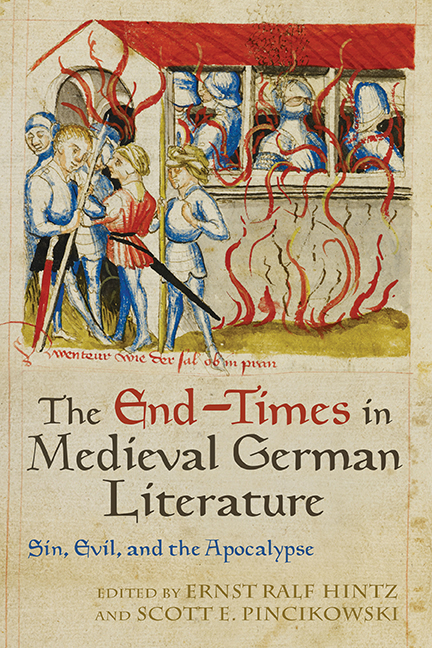Book contents
- Frontmatter
- Dedication
- Contents
- Acknowledgments
- Introduction
- 1 Thiu wirsa giburd: Cain’s Legacy, Original Sin, and the End of the World in the Old Saxon Genesis
- 2 The Heliand Revisited: Spiritual Transgendering and the Defiance of Evil
- 3 The Beginning of the End: Binary Dynamics and Initiative in Hartmann von Aue’s Gregorius
- 4 Poetic Reflections in Medieval German Literature on Tragic Conflicts, Massive Death, and Armageddon
- 5 Beyond Good and Evil: Apocalyptic Vision without Judgment in the Nibelungenlied. An Essay
- 6 End-Times in the Hall: The Modern Reception of the Apocalyptic Ending of the Nibelungenlied
- 7 Past Present, Future Present? Visualizing Arthurian Romance and the Beholder’s Share in a World That Refuses to End
- 8 Ich diene und wirbe / biz ich gar verdirbe: Lovesickness, Apocalypse, and the End-Times in Mauritius von Craûn and Das Nibelungenlied
- 9 The Slippery Concept of Evil in Hartmann von Aue’s Erec and Iwein
- 10 Wigamur’s Lessons on the Complexity of Evil
- 11 The Miracles of the Antichrist
- 12 Monsters and Monstrosities in the Pamphlet Wars of the Reformation
- Notes on the Contributors
- Index
4 - Poetic Reflections in Medieval German Literature on Tragic Conflicts, Massive Death, and Armageddon
Published online by Cambridge University Press: 21 March 2020
- Frontmatter
- Dedication
- Contents
- Acknowledgments
- Introduction
- 1 Thiu wirsa giburd: Cain’s Legacy, Original Sin, and the End of the World in the Old Saxon Genesis
- 2 The Heliand Revisited: Spiritual Transgendering and the Defiance of Evil
- 3 The Beginning of the End: Binary Dynamics and Initiative in Hartmann von Aue’s Gregorius
- 4 Poetic Reflections in Medieval German Literature on Tragic Conflicts, Massive Death, and Armageddon
- 5 Beyond Good and Evil: Apocalyptic Vision without Judgment in the Nibelungenlied. An Essay
- 6 End-Times in the Hall: The Modern Reception of the Apocalyptic Ending of the Nibelungenlied
- 7 Past Present, Future Present? Visualizing Arthurian Romance and the Beholder’s Share in a World That Refuses to End
- 8 Ich diene und wirbe / biz ich gar verdirbe: Lovesickness, Apocalypse, and the End-Times in Mauritius von Craûn and Das Nibelungenlied
- 9 The Slippery Concept of Evil in Hartmann von Aue’s Erec and Iwein
- 10 Wigamur’s Lessons on the Complexity of Evil
- 11 The Miracles of the Antichrist
- 12 Monsters and Monstrosities in the Pamphlet Wars of the Reformation
- Notes on the Contributors
- Index
Summary
Introduction: War and Death
THERE ARE MANY RESONS for us to embrace literature and to acknowledge it as an essential medium to explore and discuss the meaning of human life. From the earliest time, if we think of Homer's Iliad and Odyssey, people have struggled to come to terms with the dialectics of all existence. It is difficult to handle the paradox of theodicy, the realization that the human creature has often been nothing but a horrible beast, slaughtering many people if the occasion and opportunity arise, and the observation that violence surfaces more commonly than love. The literary discourse, especially in the genre of heroic epics, has proven to be open, flexible, responsive, energetic, and expressive in regard to the fundamental need people have to cope with issues, sometimes heartrending, sometimes illuminating, sometimes exuberant, sometimes offering hope, sometimes threatening to annihilate the human race. Even if fictional texts are not chronicles, they still chronicle the dark and bright sides of human existence and serve as crucial catalysts for the analysis of problematic cases pertaining to love, hatred, the quest for God, and the inquiry about the meaning of death.
Above all, war and its terrible aftermath are common topics of ancient and medieval heroic epics, and that issue has, unfortunately, continued to torture us to the very present. Little wonder that many poets have reflected on those horrors and tried to make at least some sense out of them, or, to put it differently, to lend words to those terrible experiences that seem to be ineffable. How can people do this to other people? Both the Holocaust and the atomic bomb have demonstrated that there is virtually nothing to hold back governments, armies, private organizations, and other groups from developing ever more devastating weapons, allegedly with the purpose of defending themselves. The arms race is an ever-ongoing process that began thousands of years ago, although the modern weapons industry has now reached an unforeseen level at which those weapons can annihilate all of humankind. To argue politically, we could even go so far as to claim that the modern world has reached an unprecedented readiness to commit mass violence that makes the conditions in the Middle Ages look rather different.
- Type
- Chapter
- Information
- The End-Times in Medieval German LiteratureSin, Evil, and the Apocalypse, pp. 72 - 97Publisher: Boydell & BrewerPrint publication year: 2019

